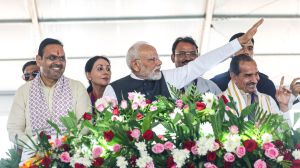Developing countries must invest more in farm sector: World Bank
If the present government required a much-needed fillip, given the slap on the wrist it has received from the CAG...

If the present government required a much-needed fillip, given the slap on the wrist it has received from the CAG, here it comes from the World Bank.
In the World Development Report 2008 released on Friday, the bank has advocated for “improving the investment climate for rural non-farm business and job schemes in rural areas”. Going into little more specifics, it said, “Job programmes could entail building rural roads, planting trees in denuded areas, and working to de-silt canals and ponds.”
Making agriculture its focus, the report titled ‘Agriculture for Development’ argues in favour of greater investment in the primary sector for transforming economies, which is vital to the welfare of the 600 million rural poor, most of whom are situated in Asia. To buttress, the report says, “(F)or the poorest people, GDP growth originating in agriculture is about four times as effective in reducing poverty as the growth originating outside the sector.”
Given the transforming economies unease with agricultural subsidies in the West, Alain de Janvry, Co-Team Leader of the report, intriguingly, said, “Globally, countries must deliver a level playing field for trade.”
Putting its major thrust on improvement in agricultural productivity the report observes, “The livelihood of farmers, especially in the lagging regions, can be improved by increasing the productivity of staple crops.” In the Indian context, the bank argues that the rise in crop yields seen during the Green Revolution has had a significant impact on poverty. But it has remained stagnant in India since the mid 1990s; in fact, agricultural labour productivity growth has been more rapid in China and Bangladesh during this period.
The report also highlights the need to invest in rural infrastructure. It observes that public investment on agriculture in India is heavily skewed towards providing subsidies rather than investments. To be precise, “subsidies are more than four times that of public investments in agriculture.” These subsidies, particularly on water and electricity, have disproportionately affected smallholders and exacerbated water scarcity.
Commenting on the report, Dr Ashok Gulati, Asia Director, IFPRI, said, “High value agricultural products are today more than half in value as compared to food grains, but these products are perishable in nature; so the report is right in calling for public investment to address this lacuna. Only then can agriculture become profitable.”
While agricultural economist Dr Y K Alagh opined, “The report is right to the extent that it advises to foster rural-urban linkages so as to increase productivity. But public investment in agriculture alone will not be able to increase profitability as terms of trade have moved against agriculture because of the fact that input prices have risen faster than output prices.”




- 01
- 02
- 03
- 04
- 05


























